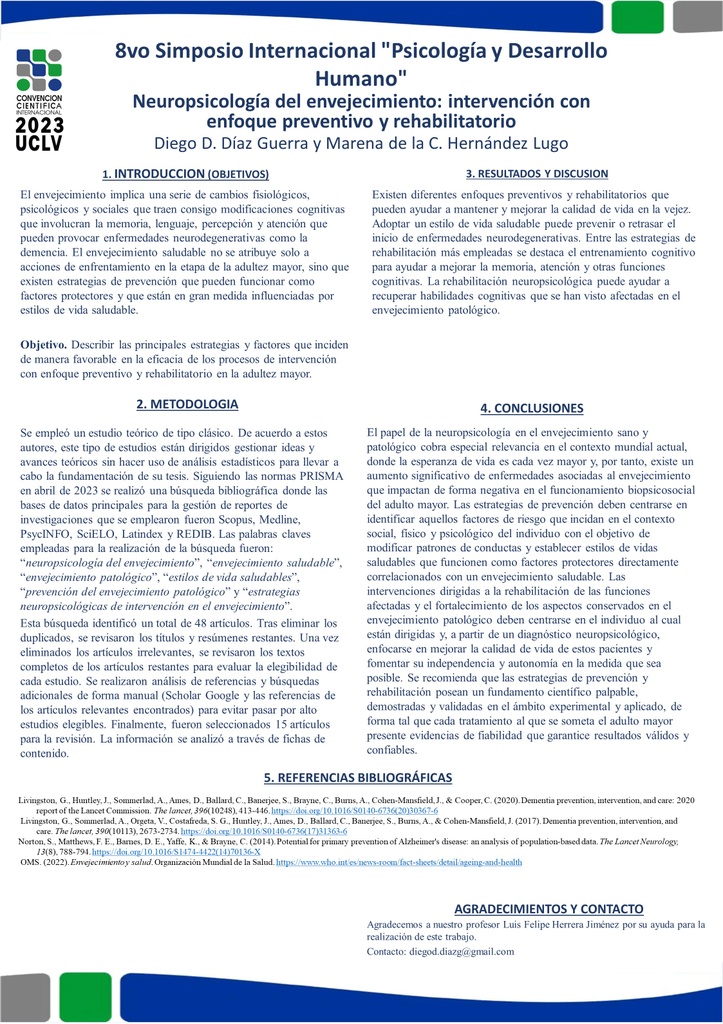Executive Secretary

VIII Simposio Internacional "Psicología y Desarrollo Humano" 2023

Introducción. El envejecimiento implica una serie de cambios fisiológicos, psicológicos y sociales que traen consigo modificaciones cognitivas que involucran la memoria, lenguaje, percepción y atención que pueden provocar enfermedades neurodegenerativas como la demencia. El envejecimiento saludable no se atribuye solo a acciones de enfrentamiento en la etapa de la adultez mayor, sino que existen estrategias de prevención que pueden funcionar como factores protectores y que están en gran medida influenciadas por estilos de vida saludable. Objetivo. Describir las principales estrategias y factores que inciden de manera favorable en la eficacia de los procesos de intervención con enfoque preventivo y rehabilitatorio en la adultez mayor. Método. Se empleó un diseño teórico clásico, seleccionando de manera direccionada los artículos pertinentes a la temática indexados en Scopus, Medline, PsycINFO, SciELO, Latindex y REDIB. Desarrollo. Existen diferentes enfoques preventivos y rehabilitatorios que pueden ayudar a mantener y mejorar la calidad de vida en la vejez. Adoptar un estilo de vida saludable puede prevenir o retrasar el inicio de enfermedades neurodegenerativas. Entre las estrategias de rehabilitación más empleadas se destaca el entrenamiento cognitivo para ayudar a mejorar la memoria, atención y otras funciones cognitivas. La rehabilitación neuropsicológica puede ayudar a recuperar habilidades cognitivas que se han visto afectadas en el envejecimiento patológico. Conclusiones. La neuropsicología del envejecimiento constituye el punto de partida para desarrollar estrategias preventivas y enfoques rehabilitatorios en la adultez mayor. Es una disciplina fundamental en tanto contribuye a mejorar la calidad de vida de las personas mayores y mantener la salud cognitiva.
Introduction. Aging involves a series of physiological, psychological and social changes that bring with them cognitive modifications involving memory, language, perception and attention that can lead to neurodegenerative diseases such as dementia. Healthy aging is not only attributed to coping actions in older adulthood, but there are prevention strategies that can function as protective factors and are largely influenced by healthy lifestyles. Objective. To describe the main strategies and factors that favorably affect the effectiveness of intervention processes with a preventive and rehabilitatory approach in older adulthood. Method. A classic theoretical design was used, selecting in a directional way the articles relevant to the topic indexed in Scopus, Medline, PsycINFO, SciELO, Latindex and REDIB. Development. There are different preventive and rehabilitative approaches that can help maintain and improve the quality of life in old age. Adopting a healthy lifestyle can prevent or delay the onset of neurodegenerative diseases. Among the most commonly used rehabilitation strategies is cognitive training to help improve memory, attention and other cognitive functions. Neuropsychological rehabilitation can help to recover cognitive skills that have been affected in pathological aging. Conclusions. The neuropsychology of aging constitutes the starting point for developing preventive strategies and rehabilitative approaches in older adulthood. It is a fundamental discipline in that it contributes to improving the quality of life of the elderly and maintaining cognitive health.
Sobre el ponente

Diego Daniel Díaz Guerra

Discussion